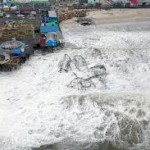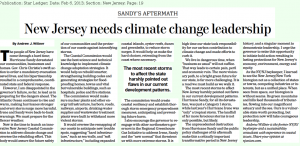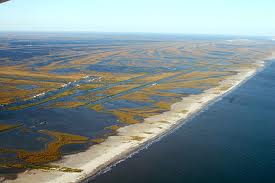|
Responsible Rebuilding After Sandy Taking Climate Change Seriously NJToday.net, The South Jersey Journal, and OpEdNews.com have published this as an oped and open letter to Governor Christie. The Star Ledger published the OPED as well Four Walls and a Roof quoted from the OPED “many New Jerseyans- among other concerned parties- are urging the New Jersey Coastal Commission and various state and local authorities to take a more proactive stance. In particular, Andrew Willner, past NY/NJ Baykeeper former scholar at Monmouth University’s Urban Coast Institute has called on Governor Christie and the Commission to “make the hard choices…to retreat from the coast when necessary.” The following link is the letter sent to Governor Christie Sandy Memo to Christie.
|
|
The people of New Jersey have come through a hard time; Hurricane Sandy devastated  our communities, businesses and homes. I want to thank the Governor for his strong leadership through it all. His swift action in ordering a mandatory evacuation saved lives, and his bipartisanship resulted in a comprehensive, coordinated state and federal response. our communities, businesses and homes. I want to thank the Governor for his strong leadership through it all. His swift action in ordering a mandatory evacuation saved lives, and his bipartisanship resulted in a comprehensive, coordinated state and federal response.
However, I am disappointed in the Governor’s failure, so far, to lead us in preparing for the dangers ahead. The Atlantic Ocean continues to rise and warm, making hurricanes stronger and every storm surge more harmful. Irene and Sandy were back-to-back warnings. Now is the time to prepare for the fiercer weather of the very near future. Now is the time to launch an innovative N.J. Coastal Commission to address climate change and oversee the rebuilding effort. This body would assure the future safety of our communities, and the protection of our coasts against intensifying storms. The N.J. Coastal Commission would use the best science and technical knowledge to implement climate change adaptation strategies. It would help us rebuild smarter, strengthening building codes, and generating strategies for flood-proofing homes, towns, and vital but vulnerable buildings, such as hospitals, police and fire stations. The Commission would make sure our nuclear plants and other energy infrastructure; harbors, roads, railways, and airports; drinking water supplies; and wastewater treatment plants were built to withstand more violent storms. It would oversee the re-mapping of our coasts to anticipate new trouble spots, suggesting The N.J. Coastal Commission would create coastal resiliency and establish thorough storm emergency preparedness measures, anticipating and preventing future harm. I also encourage the Governor to re-engage with other Northeastern state governors in We live in dangerous time, when “business as usual” will not suffice.That way leads to certain pain, peril and economic ruin. The more visionary path, to A Bright Green Future for our state is far more challenging. It is a road we must build as we walk it. The most recent storms to impact New Jersey harshly pointed out flaws in our current development patterns. Hurricane Sandy, for all its devastation, was just a Category 1 storm, while last year’s Hurricane Irene was “only” a tropical storm. The landfall of far more ferocious, future storms is not only possible, but likely. The unprecedented destruction from Hurricane Sandy and the public policy challenges of As the NY/NJ Baykeeper, I learned to see the New Jersey/New York Bioregion not as a collection of states or towns, competing industries or interests, but as a unified place. When seen from space our Bioregion is without seams. Its green mountains and hills feed thousands of tributaries, flowing into our magnificent estuary and the sea. Ours is a vulnerable state worth protecting, but protection now will take courageous leadership. |
|



